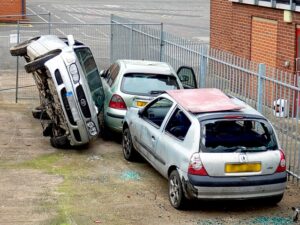

Most states require you to have basic personal auto insurance, which gives you some financial protection in the event of an accident. But is it enough? What are the options? Find out how car insurance works and what insurance options are available.
Understanding Car Insurance: The Basics
Car insurance is an agreement between you and the insurance company that protects you from financial damage in the event of an accident or theft.
Car insurance provides protection for:
Property – such as damage or theft a car
Liability – Your legal liability to others for personal or property damage
Medical expenses – cost of injury treatment maintenance.
Most US states require basic car insurance and laws vary.
Policies are usually issued for a period of six months or one year and are renewable. The insurance company sends you a message when it is time to renew the policy and pay your premium.

Who is covered by my car insurance and under what circumstances?
Your car insurance covers you and other family members included in your policy, whether you’re driving your car or someone else’s car (with their permission). Your policy also provides cover if someone not covered by your policy drives your car with your permission.
Your personal car insurance only covers personal driving, whether you’re commuting to work, running errands or traveling. There is no insurance cover if you use your car for commercial purposes, such as delivering pizzas.
Personal auto insurance also won’t cover you if you use your car to transport others through a ride-sharing service like Uber or Lyft.
Is car insurance compulsory?
Car insurance requirements vary from state to state. If you are financing a car, your lender may also have their own requirements. In almost all states, car owners must have the following:
Bodily Injury Liability – covers costs related to injuries or death caused by you or another driver while operating your vehicle.
Property damage liability – which compensates others for damage you or another driver driving your car causes to another vehicle or property, such as a fence, building or utility pole.
In addition, many states require you to carry:
Uninsured motorist insurance coverage compensates you if an accident is caused by a driver who does not have motor insurance or in the event of a collision. You can also buy car insurance to cover the costs if another driver does not have enough insurance cover to cover the costs of a serious accident.
Even if PIP coverage and uninsured motorist coverage are optional in your state, consider adding them to your policy for more financial protection.
What other types of car insurance are typical?
The most basic statutory car insurance covers damage caused by your car, but not damage to your own car. To protect your own car, consider these optional coverages:
Collision insurance covers damage to your car resulting from a collision with another vehicle or object (such as a tree or guardrail) while you are at fault. While collision insurance doesn’t cover mechanical breakdowns or normal wear and tear on your car, it does cover damage caused by potholes or your car rolling.
A comprehensive insurance cover provides protection against theft and damage caused by events other than a collision, such as: E.g. fire, flood, vandalism, hail, falling rocks or trees and other hazards, even from an asteroid impact!
A glass protector provides protection against common windshield damage.
What is gap insurance and do I need it?
Full and comprehensive insurance only covers the market value of your car, not the amount you paid for it – and new cars depreciate quickly. If your car is totaled or stolen, there may be a “gap” between what you owe on the vehicle and your insurance coverage. To cover this, consider buying gap insurance to cover the gap. Note that for leased vehicles, hatch cover is usually included in your lease payments.
What information do I need to request a car insurance quote?
A valid driver’s license
Your Vehicle Identification Number (VIN)
The physical location of vehicle.
During your offer:
You’ll learn about coverage options, including state minimums, to help you choose the best auto insurance for you and your family.
We’ll also ask you a few questions so we can help you find any savings you may qualify for.
You will then receive your personal taxi. From there you can buy directly online. It’s that easy.
How to compare car insurance.
To best compare car insurance quotes from different companies, make sure you choose the same:
Coverage Amount: Although some are mandatory, make sure you choose the same amount for each quote.
Coverage limits: There are minimum amounts, but using our coverage calculator can help you decide what amount you want.
Deductible: Depending on the coverage, you need to think about how much you can pay to repair your vehicle. In most cases, raising your deductible can lower your bill.
This gives you a complete overview of what each insurer has to offer.
Mandatory insurance coverage for motor vehicle insurance.
These pay for injuries or damage to other people and/or their property caused by an accident that is your fault.
following are the auto insurance coverage:
Personal injury protection
Property damage protection
Insurance cover for uninsured motorists
The level of protection for these covers can be increased beyond the minimum state requirements.
Additional insurance coverage for vehicle insurance.
While these may not be necessary, they can give you additional protection. This insurance cover usually covers any damage and/or injury you incur.
In general, here are some optional coverages:
crash
Extensive
Health insurance
Rent allowance
Insurance against mechanical breakdowns
Some things to consider: Would you be able to pay to repair or replace your vehicle if it was damaged in an accident? Do you need a rental car while your car is being repaired due to an insured accident?
We can help you choose the insurance cover you need.
We get it. Buying car insurance is not the easiest thing. We are ready to answer all your questions, such as:
How much personal injury coverage should I have?
How Much Should Property Damage Coverage Be?
How high should my deductible be?